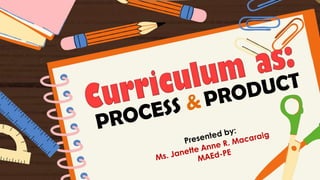CURRICULUM AS A PROCESS AND A PRODUCT.pptx
- 6. (1) Curriculum as a process is about the practice of teaching. This is where the teacher places action using the content to achieve an outcome (Bilbao, et. al., 2015). (2) Curriculum processes are the procedures involved in creating, using, and evaluating the curricula presented in various curriculum projects (Villena, et. al., 2015). ŌĆó Individual needs, interests, and experiences of students, and adapting the curriculum to meet their unique learning needs.
- 8. (1) ŌĆ£the intersection of the content and process.ŌĆØ
- 13. The curriculum is so much necessary raw material, but warmth is the vital element for the growing plant and for the soul of the child. -Carl Jung
- 15. (1) The product from the curriculum is a student equipped with the knowledge, skills, and values to function effectively and efficiently (Bilbao, et. al., 2015). (2) products are the results of the curriculum development processes which act as bases for instructional decisions in the classroom (Villena, et. al., 2015) -refers to the tangible outcome of the curriculum development process, such as textbooks, lesson plans, and assessments. -This approach focuses on the finished product and its alignment with educational standards and goals.
- 18. Include details about the topics to be taught, teaching goals, and suggestions for instructional strategies.
- 19. Include details about the topics to be taught, teaching goals, and suggestions for instructional strategies.
- 20. Include details about the topics to be taught, teaching goals, and suggestions for instructional strategies.
- 21. ŌĆó Courses of Study/Syllabi - Specify the content, learning outcomes, and time allocations for the various topics. Other tangible outcomes ŌĆó Resource Unit - Specify the content, learning outcomes, and time allocations for the various topics.
- 23. Bilbao, P. et. al. (2015). Curriculum development. Manila: Lorimar Publishing, Inc. Villena, D. et. al. (2015).Curriculum development. Manila: Adriana Publishing Co., Inc.
Editor's Notes
- ┬Ātechnology integration┬Āframework that identifies three types of knowledge instructors need to combine for successful edtech integrationŌĆötechnological, pedagogical, and content knowledge (a.k.a. TPACK).┬Ā
- PCK - teachersŌĆÖ knowledge regarding foundational areas of teaching and learning, including curricula development, student assessment, and reporting results.┬Ā - seeks to improve teaching practices by creating stronger connections between the content and the pedagogy used to communicate it.
























